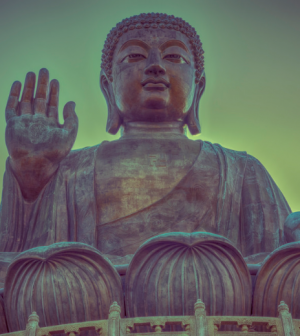- Learning to appreciate the ‘slow’Posted 2 days ago
- A Mother’s Journey Through Parenthood and AcceptancePosted 6 days ago
- How to Avoid Common Missteps in Household Money ManagementPosted 2 weeks ago
- Mothering in a Fractured TimePosted 3 weeks ago
- Beneath the Surface: Revealing Life’s Goals nurtured from a Spiritual SeedPosted 4 weeks ago
- How We Kept Marital Peace while Traveling the World with Our KidsPosted 1 month ago
What The Buddha Might Say To “The Donald”

By Ed and Deb Shapiro
Did the Pope just out-trump Trump? While the Donald wants to evict 11 million immigrants, the Pope talks of inclusivity, compassion and human kindness. Has Trump got it all upside down? Shouldn’t we be adhering to the golden rule by treating others as we would want to be treated ourselves?
There is an absurd misunderstanding that what we think, say or do will have no affect on us, that we can get angry, be rude, shout, put people down, incite anger, or be utterly disrespectful, and can just walk away scot free without there being any blemish on our own life. The challenge is when we believe we are always right, as we will invariably end up tripping over our self-righteous ego, unable to admit we may be wrong (ala Trump).
We are not presuming to know what the Buddha might say to Mr. Trump, just as we don’t presume to know what he might say to any of us. But the Buddha clearly taught about the dangers of greed, hatred and ignorance, what he called the three poisons, that Trump seems to display quite frequently. Where greed grabs our desires, hatred uses fear to incite insecurity and then blames everyone else, while ignorance clouds our vision.
The three fires of greed, hatred and ignorance destroy the mind from which they are born. The Buddha
The Buddha very simply reminded us that, for instance, when we point a finger at someone then there are three fingers pointing back at us. Just as when Trump seems to find fault with everyone else and never himself, so when we put divisiveness and hate into the world it will inevitably find its way back to us and we become the hated.
Greed has many relatives, such as jealousy, addiction, ambition, self-centeredness, pride, grasping and clinging, giving rise to dissatisfaction, irritation, frustration, irritability, even depression. The craving to have and possess stops us from giving; it generates a fear of not having. Donald Trump personifies greed in his desperate desire to win at all costs, no matter what it is or how he does it.
Whatever words we utter should be chosen with care for people will hear them and be influenced by them for good or ill. The Buddha
Hate is destructive, indiscriminate, like a snake it can rise up out of nowhere and attack. It is most seen in prejudice, whether against different races, political beliefs, or sexual preferences. When we are fixed in the belief that we are right, then anything that questions or threatens that belief becomes the enemy and must be eliminated.
Yet the Buddha pointed out that such hatred becomes our own worst enemy for no matter how much we try to annihilate the hated one, the hate remains inside us, slowly destroying and eating away at our own happiness.
Holding on to anger is like grasping a hot coal with the intent of throwing it at someone else; while you are the one who gets burned. The Buddha
Abhorrence towards others is based on the belief that we are all separate from each other, that we can hurt another without hurting ourselves, that I am more important than you. It breaks friendships and families, while creating self-righteousness and arrogance. Prejudice closes our heart and shuts down our sensitivity.
The moment that you think of doing harm to someone, that thought harms you first. Unless you hate yourself, you can’t hate others. If you love others, that means that you create the feeling of love within you first, and then you offer the love to others. Your thoughts pass through your entire system, and are expressed through your mouth and through your hands and actions. Without thinking, you cannot speak or act. So the harmful thought, from its very origin, spoils your system. In other words, you can’t hit anyone else without striking yourself. Sri Swami Satchidananda
Where hatred closes our heart, delusion makes us believe there is a permanent, separate and fixed ‘me’ so that we take ourselves very seriously. This is the ignorance of our essential connectedness with all others.
When we feel love and kindness toward others, it not only makes others feel loved and cared for, but it helps us also to develop inner happiness and peace. The Dalai Lama
****
 Award-Winning Authors Ed and Deb of Be The Change, How Meditation can Transform You and the World, are mindfulness, meditation and yoga experts. Deb’s new novel is: Merging: Women in Love — what happens when you fall in love with the least likely person of the least likely gender? – and she’s the author of Your Body Speaks Your Mind, now in 19 languages.
Award-Winning Authors Ed and Deb of Be The Change, How Meditation can Transform You and the World, are mindfulness, meditation and yoga experts. Deb’s new novel is: Merging: Women in Love — what happens when you fall in love with the least likely person of the least likely gender? – and she’s the author of Your Body Speaks Your Mind, now in 19 languages.
They have three meditation CDs. See more at EdandDebShapiro.com







